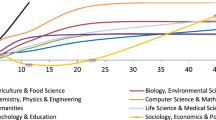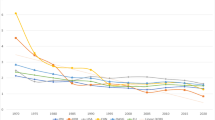Abstract
In the 1990s, one of the major concerns related to university performance in Argentina was how to encourage academics to increase knowledge production, the new central economic commodity in a global market. Therefore, in 1994 a unique faculty merit-pay programme, based on peer evaluation, was introduced: the Incentive Programme for Research professors of Public Universities. Although it has been in place for twenty years without any interruption, it is not the same policy instrument as it was 20 years ago, when first implemented, and this is a key reason for its continuity. This paper adopts a methodology based on the assumption that three attributes of policy instruments could help recognise policy change: the actors targeted, the incentives used to enrich policy objectives and the economic resources mobilised. While in its beginnings the programme was characterised as an important way of accessing funds, twenty years later the acquisition of prestige and academic power has increased its importance. This transformation explains why it remains in place today, and was not abolished with the change of government in 2003.
Similar content being viewed by others
References
Araujo, S. (2003) Universidad, investigación e incentivos. La cara oscura, Buenos Aires: Ediciones Al Margen.
Arocena, R. and Sutz, J. (2005) Latin American Universities: From an original revolution to an uncertain transition’, Higher Education 50(4), 573–592. doi: 10.1007/s10734-004-6367-8
Bemelmans-Videc, M., Rist, R. and Vedung, E. (ed). (2011) Carrots, Sticks, and Sermons: Policy instruments and their evaluation, New Brunswick: Transaction Books.
Bezes, P. (2007) The Hidden Politics of Administrative Reform: Cutting French Civil Service Wages with a Low‐Profile Instrument, Governance, 20(1): 23–56.
Bourdieu, P. (1999) The specificity of the scientific field, Social Science Information, 14 (6): 31–50.
Bourdieu, P. (2008) El oficio de sociólogo, Buenos Aires: Siglo XXI.
Calvo, E. and Murillo, M. V. (2012) ‘Argentina: The Persistence of Peronism’, Journal of Democracy 23(2): 148–161.
Chiroleu, A. and Iazzeta, O. (2005) ‘La reforma de la educación superior como capítulo de la reforma del Estado. Peculiaridades y trazos comunes’, in Rinesi, E.; Soprano, G. and Suasnábar, C. (Ed.) Universidad, reformas y desafíos. Dilemas de la educación superior en Argentina y en Brasil, Buenos Aires: Prometeo/UNGS: pp. 15–38.
De Lovinfosse, I. (2008) How and why Do Policies Change?: A Comparison of Renewable Electricity Policies in Belgium, Denmark, Germany, the Netherlands, and the UK, Brussels: Peter Lang.
Galaz-Fontes, J. and Gil Antón, M. (2013) The Impact of Merit-pay Systems on the Work and Attitudes of Mexican Academics, Higher Education, 66(3): 357–374. doi: 10.1007/s10734-013-9610-3
García de Fanelli, A. (2005) Universidad, organización e incentivos: desafíos de la política de financiamientos frente a la complejidad institucional, Buenos Aires: Miño y Dávila.
García de Fanelli, A. (2012) Financiación de la Educación Superior Argentina: Cambios y continuidades entre los años 90 y la primera década del 2000, Educación Superior y Sociedad, 16(1): 16–36.
Grugel, J. and Riggirozzi, P. (2012) Post-neoliberalism in Latin America: Rebuilding and reclaiming the state after Crisis, Development and Change, 43(1): 1–21. doi: 10.1111/j.1467-7660.2011.01746.x
Hood, C. (1983) The tools of government, London: Macmillan.
Knorr-Cetina, K. (1981) The manufacture of knowledge: An essay on the constructivist and contextual nature of science. An Essay on the Constructivist and Contextual Nature of Science, Exeter: A. Wheaton & Co. Ltd.
Lascoumes, P. and Le Galès, P. (2007) ‘Introduction: Understanding public policy through its instruments - from the nature of instruments to the sociology of public policy instrumentation’, Governance, 20 (1): 1–21.
Latour, B. and Woolgar, S. (1986) Laboratory of Life: The Construction of Scientific Facts. Princenton: University.
Levitsky, S. and Murillo, M. V. (2003) ‘Argentina weathers the storm’, Journal of Democracy 14(4): 152–166.
Lorenz, C. (2012) ‘If you’re so smart, why are you under surveillance? Universities, neoliberalism, and new public management’. Critical inquiry 38(3): 599–629.
Marginson, S. and Ordorika, I. (2010) ‘Hegemonía en la era del conocimiento: Competencia global en la Educación superior y la investigación científica?’, México: Universidad Nacional Autónoma de México, Seminario de Educación Superior. http://works.bepress.com/ordorika/47/
Mc Donnell, L. M. and Elmore, R. (1987) Alternative Policy Instrument, Santa Mónica: The Rand Corp.
Ministry of Education, Science and Technology. Resolution No 811/2003. Procedural Manual 2003. Argentina.
Ministry of Education. Resolution No 1879/2008. Procedural Manual 2008. Argentina.
Mollis, M. (2007) ‘Latin American university transformation of the 1990s: altered identities?’ in Forest, J. and Altbach, P. G. (ed.) International handbook of Higher education, Netherlands: Springer, pp. 505–515.
Mollis, M. and Marginson, S. (2002) ‘The assessment of universities in Argentina and Australia: Between autonomy and heteronomy’, Higher Education 43: 311-330.
Neave, G. (1998) ‘The evaluative state reconsidered, European Journal of Education, 33(3), 265-284.
Palacios, C.; Curti, C. and Alonso, A. (1996) ‘El programa de incentivos a tres años de su creación’, La Universidad. Boletín Informativo de la Secretaría de Políticas Universitarias, III, núm. 7. Buenos Aires, Ministerio de Cultura y Educación: 3–8.
Palier, B. (2007) Tracking the evolution of a single instrument can reveal profound changes: the case of funded pensions in France, Governance, 20(1): 85–107.
Sanllorenti, P. (2003) ‘El Modelo Neoliberal en las Universidades Nacionales: La Maldición de los Incentivos a los Docentes Investigadores’, Buenos Aires: CONADU.
Sarthou, N. (2015) ‘Los instrumentos de política como enfoque de análisis de los sistemas de pago al mérito: contribuciones analíticas a partir del caso argentino’, Perfiles Educativos, Vol. 150 XXXVII, núm. 149, 150–168.
Schneider, A. and Ingram, H. (1990) Behavioral assumptions of policy tools, The Journal of Politics 52 (2): 510–529.
Secretariat of University Policies (SPU). Resolution No 2078/14. 2014 Index value. Argentina.
Secretariat of University Policies (SPU). Resolution No 337/09. 2009 Index value. Argentina.
Secretariat of University Policies (SPU) University Yearly Statistics. 1996, 1999–2003, 2000–2004, 2005, 2006, 2007, 2008, 2009, 2010, 2011, 2012. Buenos Aires: Ministry of Education.
Suasnábar, C. and Rovelli, L. (2012) ‘Impensar las políticas universitarias en la Argentina reciente’, in Chiroleu, A.; Marquina, M. and Rinesi, E. (Ed.) La política universitaria de los gobiernos Kirchner: continuidades, rupturas, complejidades, Los Polvorines: Universidad Nacional de General Sarmiento, pp. 49–74.
Tiramonti, G. (1999), ‘Los cambios en la universidad: una modernización diferenciadora’, in Tiramonti, G.; Suasnábar, C. and Seoane, V. (Ed.) Políticas de modernización universitaria y cambio institucional, La Plata: Universidad Nacional de La Plata, Serie Estudios e Investigaciones, vol. 38, pp. 9–46.
Torres, C. A. and Schugurensky, D. (2002) ‘The political economy of Higher education in the era of neoliberal globalization: Latin America in comparative perspective’. Higher Education 43(4): 429–455.
Vaccarezza, L. (2000) ‘Las estrategias de desempeño de la profesión académica. Ciencia periférica y sustentabilidad del rol de investigador universitario’. Redes 7(15): 15–43.
Vedung, E. (2011) ‘Policy Instruments: Typologies and theories’, in Bemelmans-Videc, M.; Rist, R. and Vedung, E. (ed). Carrots, Sticks, and Sermons: Policy instruments and their evaluation. New Brunswick: Transaction Books, pp. 21–58.
Vessuri, H. M. (1993) The development gap: implications for Higher education and research in Latin America, Higher Education Policy 6(4): 25–28.
Wylde, C. (2011). State, society and markets in Argentina: The political economy of neodesarrollismo under Néstor Kirchner, 2003–2007. Bulletin of Latin American Research 30(4): 436–452.
Author information
Authors and Affiliations
Corresponding author
Rights and permissions
About this article
Cite this article
Sarthou, N.F. Twenty Years of Merit-Pay Programme in Argentinean Universities: Tracking Policy Change through Instrument Analysis. High Educ Policy 29, 379–397 (2016). https://doi.org/10.1057/s41307-016-0001-0
Published:
Issue Date:
DOI: https://doi.org/10.1057/s41307-016-0001-0




